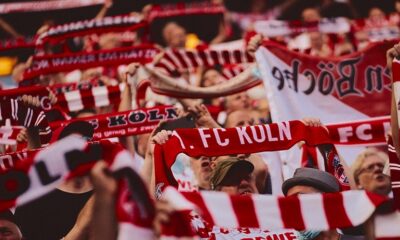Bundesliga
Dietmar Hopp is giving Hoffenheim back to the fans. How did he join the club and what happens next?
How bad is Hoffenheim? So bad that its owner wants to turn the club over to the fans. This joke has been repeated in various iterations since it came to light that Dietmar Hopp, the de facto owner of the club from the small village of three thousand in Hoffenheim, will return a controlling stake in the club to its members. Hoffenheim is thus returning to the 50+1 regime.
How bad is Hoffenheim? So bad that its owner wants to turn the club over to the fans. This joke has been repeated in various iterations since it came to light that Dietmar Hopp, the de facto owner of the club from the small village of three thousand in Hoffenheim, would return a controlling stake in the club to its members. Hoffenheim is thus returning to the 50+1 regime.
How can Hopp “own” Hoffenheim?
In the competitions organised by the DFL, the German Football Association, i.e. the Bundesliga and 2. Bundesliga, there is a 50+1 rule, which in simple terms states that 50% plus one vote must belong to the parent club.
It cannot happen that one investor sells the entire club, or control of it, to another investor. Nor can the appetites of one billionaire drive the club to the brink of existence.
The 50+1 rule does not, of course, prevent all the financial and other problems that a club may find itself in, but it does give fans an element of control. It gives them the certainty that their voice will resonate and the annual members’ meetings provide a platform for them to express their concerns.
An example is the long-running conflict between a group of Bayern Munich fan members and the club’s management over sponsorship by Qatar Airways.
50+1 is very popular. Thus, Bundesliga supporters watched with not too much reluctance when Dietmar Hopp gained control of the club as of 1 July 2015, which he had taken to the top flight with long-term investments.
The 50+1 rule contains an exception. A person or entity can hold a controlling stake in a club if it has continuously invested substantial sums in it for more than twenty years.
The exception was necessary because prior to the 50+1 rule, there were already clubs VfL Wolfsburg and Bayer 04 Leverkusen, founded by the car manufacturer Volkswagen and the pharmaceutical company Bayer respectively. Adopting the rule without this clause would have forced these companies to divest controlling stakes in their own clubs, which was not an option.
Who is Dietmar Hopp and how did he come to Hoffenheim?
Dietmar Hopp is now an 82-year-old German businessman and co-founder of the European international software company SAP. SAP’s value is estimated to be around $140 billion as of 2022, and although it has multiplied especially in the last decade, it is no surprise that Hopp could afford to invest a significant amount of money in his former club.
Born in Heidelberg, a town only about half an hour away from Sinsheim, on the outskirts of which lie both Hoffenheim, the village after which the club is named, and Steinsfurt, where the club’s 30,000-seat stadium has stood since 2008, Hopp played for Hoffenheim as a youth player.
Hopp has held a stake in Hoffenheim since 1989 and thanks to his years of investment was able to take control of the club in 2015.
What’s happening now?
Although the line works as a joke, the transfer of the stake is not due to the poor performance of the club, which currently sits 16th in the Bundesliga. With 19 points, the same as 15th Stuttgart, but also 17th Schalke and 18th Schalke. Bochum, Hoffenheim are only a goal difference away from the bottom.
The poor performance of the club naturally affects the mood of the fans and their criticism, as we know from competitions where ownership by one entity is common, is brought down on the owner’s head. But public opinion has not led Hoppe to drop his stake before, so there is no reason to assume that it is any different now.
Especially as the transfer of rights almost goes hand in hand with the publication of the DFL’s conclusions to resolve the problems with the exemptions to the 50+1 rule, which the Bundeskartellamt, Germany’s independent competition authority, has found problematic.
Hopp is therefore likely taking this step in order to avoid potential sanctions and intervention by the DFL. Especially in a situation where, according to Der Spiegel, Hoffenheim has been self-financing for several years.
What will this cost Hoffenheim and what changes will occur?
The last thing Hoffenheim needs to add to its sporting failures is the need to pay off an investor. However, nothing of the sort is happening. Dietmar Hopp is transferring his share to the parent club with absolutely no compensation, as he himself has confirmed.
According to Der Spiegel, the return of the rights to the parent company with around 11,000 members was due to start within days and is therefore apparently already in the process. Hopp said in an official statement to the club that his actions were never about power, and that the management had always behaved in accordance with the spirit of the 50+1 rule, before and after the application of the exemption.
“I have always considered my privilege as an appreciation of my commitment by the league and the members. The purpose of the special status I was granted was never to circumvent or undermine the 50+1 rule, which I have always been a supporter of and which has great value in German football.” he added.
So no major earthquake is expected in response to Hopp’s move at Hoffenheim. Whether sporting setbacks will unleash it, however, is another question.
Sources: Hoffenheim, DW, Spiegel, Kicker, Macrotrends.net, Bundeskartellamt










